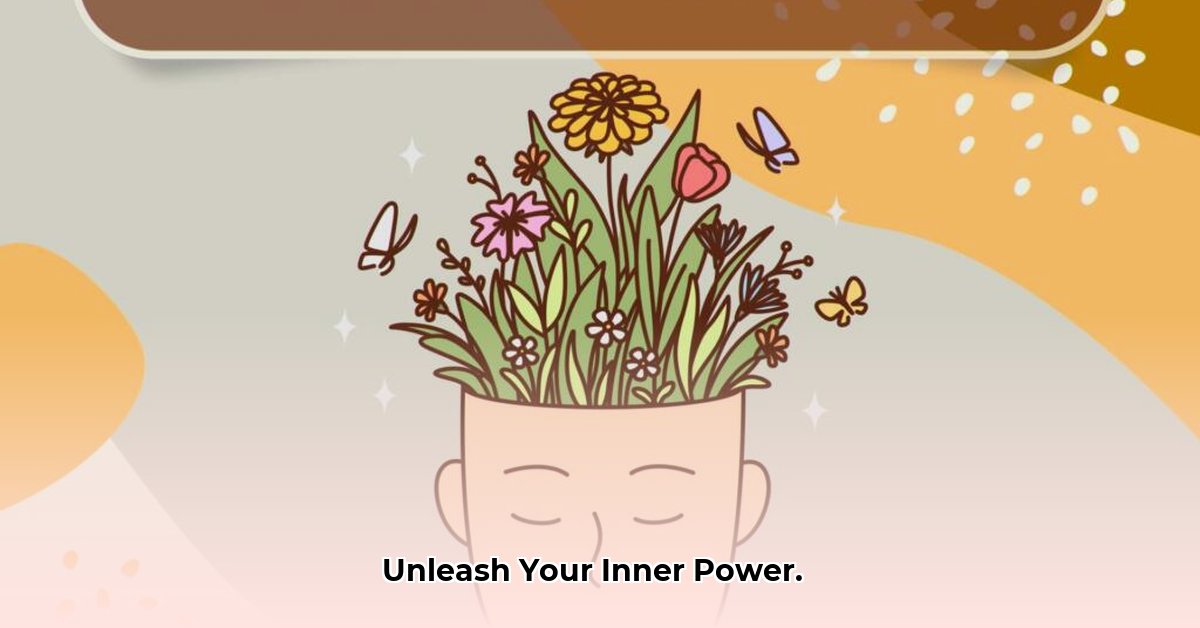Do you ever feel a longing for something more, a desire to become a better version of yourself? You’re not alone. Many individuals share this aspiration but struggle to find the right path. This comprehensive guide provides actionable strategies for personal growth, offering practical tips and techniques to cultivate lasting happiness, boost self-confidence, and achieve your full potential. For more structured guidance, check out these personal growth workshops. Let’s embark on this transformative journey together!
Mastering Self-Improvement: Your Roadmap to Sustainable Transformation
True transformation requires consistent effort and a commitment to self-discovery. Think of it like learning a new skill – there will be challenges and setbacks, but perseverance will lead to mastery. What are the most effective self-help techniques?
Understanding the Foundations of Personal Development
Personal development begins with honest self-reflection. Identify your strengths, weaknesses, values, and passions. Practices like journaling, meditation, or spending time in nature can provide valuable insights. Create a personal development plan around SMART goals: Specific, Measurable, Achievable, Relevant, and Time-bound. Break down large goals into smaller, manageable steps to maintain motivation and track progress.
Actionable Steps for Self-Improvement
For Individuals:
- Define Your Core Values: Your values serve as a compass, guiding your decisions and actions. Identify what truly matters to you – family, creativity, integrity, service to others. Understanding your values will help you stay focused and make choices that align with your authentic self.
- Set SMART Goals: Instead of vague aspirations like “be more successful,” create specific, measurable goals such as “increase my income by 10% in the next six months by taking on freelance projects.” Measurable targets empower you to maintain focus.
- Cultivate Self-Discipline: Develop daily habits that support your goals. Start with small, achievable actions and gradually add new habits as you progress. Consistent small steps lead to significant long-term results.
- Embrace Continuous Learning: Make a commitment to lifelong learning. Read books, listen to podcasts, take online courses, attend workshops, and seek out new experiences. Continuous learning keeps you adaptable, engaged, and intellectually stimulated.
- Practice Self-Compassion: Setbacks are inevitable on any journey. Learn from your mistakes without engaging in self-criticism. Treat yourself with the same kindness and understanding you would offer a friend.
For Educators:
- Integrate Self-Reflection Activities: Encourage students to reflect on their learning experiences, identifying their strengths, weaknesses, and areas for growth. Facilitate discussions about challenges and successes.
- Promote Goal-Setting Skills: Teach students how to set SMART goals for their academic performance and personal development. Help them break down large goals into smaller, manageable steps.
- Provide Diverse Learning Resources: Offer a variety of learning materials and support systems to cater to different learning styles and individual needs. Create a classroom environment that is inclusive and supportive.
- Foster a Growth Mindset: Emphasize the importance of effort, perseverance, and learning from mistakes. Celebrate progress and encourage students to embrace challenges as opportunities for growth.
For Businesses:
- Offer Professional Development Programs: Invest in training programs, workshops, and conferences that enhance employees’ skills and knowledge. Provide opportunities for employees to advance their careers and develop new expertise.
- Promote Work-Life Integration: Encourage employees to prioritize their well-being outside of work. Offer flexible work arrangements, paid time off, and wellness programs that support work-life balance.
- Foster Open Communication and Feedback: Create a culture where employees feel comfortable sharing their ideas, concerns, and seeking support from colleagues and supervisors. Implement regular feedback mechanisms to provide constructive guidance and recognition.
- Recognize and Reward Achievements: Acknowledge and celebrate employee successes, both big and small. Implement reward systems, promotions, and other forms of recognition to motivate employees and reinforce positive behaviors.
Overcoming Challenges: Navigating Obstacles on Your Journey
Use mindfulness practices when overcoming issues. Reframe obstacles to see them as opportunities.
Maintaining Momentum: A Long-Term Perspective
Self-improvement is a lifelong process, not a destination. Regularly self-assess your progress and seek feedback from trusted sources. Adjust your plans as life evolves, embracing flexibility and celebrating every milestone along the way.
Measuring Progress: Quantifying Your Success
Measuring progress is essential for staying motivated and ensuring that your efforts are yielding results. What are the most effective self-assessment instruments?
Key Takeaways:
- SMART goals provide a framework for objective progress tracking.
- Regular self-reflection helps identify strengths, weaknesses, and areas needing improvement.
- External feedback provides valuable perspective and highlights blind spots.
- Consistent effort over time is crucial for sustainable progress.
Setting the Stage: Defining Your Goals
Define SMART goals to create a clear roadmap for your personal development journey. Instead of “become a better writer,” set a goal to “write one blog post per week for the next three months and submit an article to a publication by the end of the year.”
Mapping Your Journey: Tracking Your Progress
Choose effective self-monitoring instruments to guide your journey.
- Journaling: Use a journal to record your thoughts, feelings, and experiences on a daily or weekly basis. Reflect on your progress, challenges, and insights.
- Habit Trackers: Use a habit tracker to monitor your daily habits and track your progress towards building new routines. Visual confirmation of progress reinforces motivation.
- Skill Assessments: Regularly assess your skills and knowledge in areas relevant to your goals. Use online quizzes, self-assessments, or seek feedback from experts to identify areas for improvement.
- Monthly Reviews: Conduct monthly reviews to assess your progress towards your goals, identify any roadblocks, and adjust your plans as needed.
Seeking External Validation: Gathering Feedback
Seek feedback from mentors, friends, family members, or colleagues. Be open to constructive criticism and use their insights to refine your approach.
Addressing Challenges: Overcoming Obstacles
Acknowledge that challenges are a normal part of the process. Schedule dedicated time for personal development activities. Celebrate small wins to stay motivated.
Long-Term Strategies: Sustaining Momentum
Re-evaluate your goals and strategies regularly. Adjust your approach as needed and celebrate your milestones.
Proven Strategies for Personal Growth in the Workplace
Career growth strategies in the workplace includes: continuous learning, goal-setting, networking, and maintaining work-life balance.
Key Takeaways:
- Continuous learning is vital for long-term career success.
- Building strong professional relationships is essential.
- SMART goals provide direction and motivation.
- Self-care promotes sustainable performance.
Cultivating a Growth Mindset: The Foundation for Success
Embrace the belief that your abilities can be developed through dedication and hard work. View challenges as opportunities for learning and growth.
Mastering Continuous Learning: Never Stop Growing
Commit to lifelong professional development. Identify your skill and knowledge gaps and seek out opportunities to learn and grow.
Strategic Networking: Building Your Support System
Build genuine connections with colleagues, mentors, and industry professionals. Attend industry events, join professional organizations, and engage in online communities.
Setting SMART Goals: Charting Your Course
Set specific, measurable, achievable, relevant, and time-bound goals to guide your career progression. Break down larger goals into smaller, manageable steps.
Prioritizing Self-Care: Fueling Your Engine
Prioritize sleep, exercise, healthy eating, and stress management. Take regular breaks and engage in activities that you enjoy.
Harnessing Feedback: Refining Your Approach
Actively seek constructive criticism from colleagues, supervisors, and mentors. Use this feedback to identify areas for improvement and refine your approach.
Adapting Strategies: The Long Game
Regularly review your goals and plans and adjust your strategies as you gain experience and your goals evolve. Be flexible and adaptable.
[1 Retainr. 8 Strategies for Sustainable Performance and Professional Growth. https://www.retainr.io/blog/8-strategies-for-sustainable-performance-and-professional-growth]
Building Resilience: Strategies for Thriving Under Pressure
How do you manage effective stress management techniques?
Key Takeaways:
- Resilience is a skill that can be developed through self-improvement.
- Combining cognitive techniques, behavioral changes, social support, and self-care strengthens resilience.
- Consistent personal growth is crucial for long-term resilience.
Understanding Your Inner Fortress: Foundational Principles
Build resilience to bounce back from adversity. Start with self-awareness and set achievable goals.
Actionable Strategies for Building Resilience
Customize your wellness improvement plan for building resilience.
For Individuals:
- Embrace Mindfulness: Practice mindfulness techniques for 5 minutes daily to cultivate awareness of your thoughts and feelings.
- Craft Your Narrative: Reframe negative self-talk by challenging negative thoughts and replacing them with positive affirmations.
- Small Wins, Big Impact: Set realistic goals and celebrate small achievements to build momentum and boost your confidence.
- Nourish Your Body and Mind: Prioritize sleep, healthy food, and regular exercise to support your physical and mental well-being.
- Connect and Thrive: Maintain strong social relationships and seek out mental health resources when needed.
For Organizations:
- Wellness Initiatives: Invest in employee wellness programs to promote physical and mental health.
- Support Systems: Foster supportive work environments where employees feel comfortable seeking help and support.
- Mentorship Matters: Implement mentorship programs to provide guidance and support to employees.
- Learning and Development: Encourage continuous learning to enhance employee skills and knowledge.
- Culture of Care: Create a company culture that values employee well-being and supports work-life balance.
Overcoming Obstacles: Navigating the Rough Patches
Prioritize one small step each day. Schedule dedicated self-care time and break large tasks into manageable chunks.
Sustaining Your Resilience: Long-Term Strategies
Adjust strategies as needed, learn from setbacks, and always embrace a growth mindset.
- Mindfulness Exercises For Anxiety PDF To Reduce Stress - February 26, 2026
- Mindfulness Activities for Adults PDF for Stress Relief - February 25, 2026
- Mindfulness Techniques PDF Offers Free Exercises for Calm and Focus - February 24, 2026














